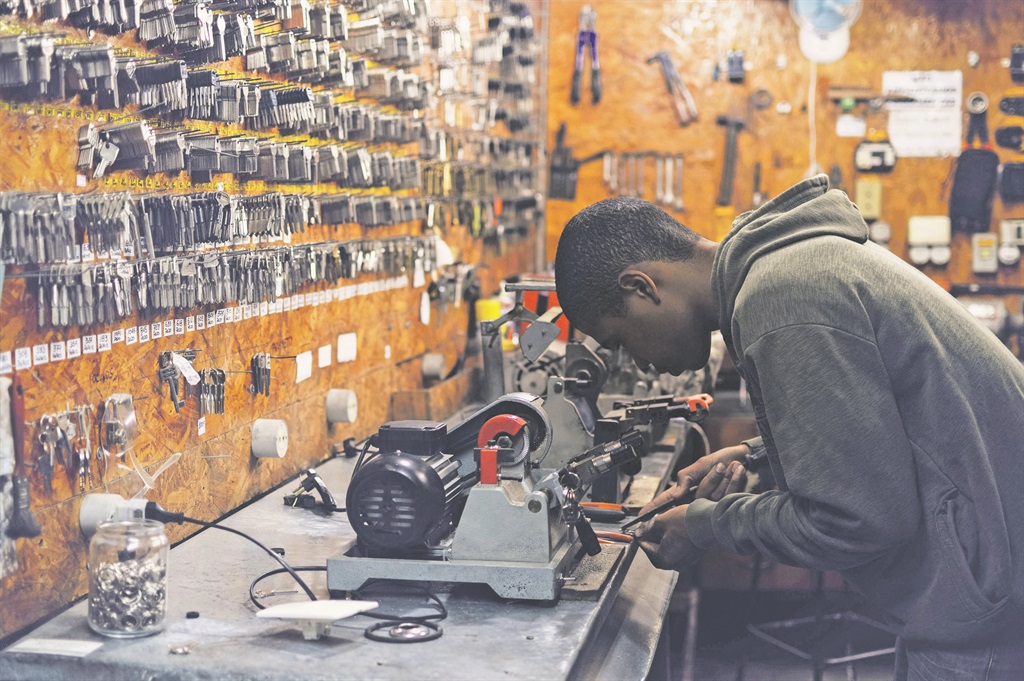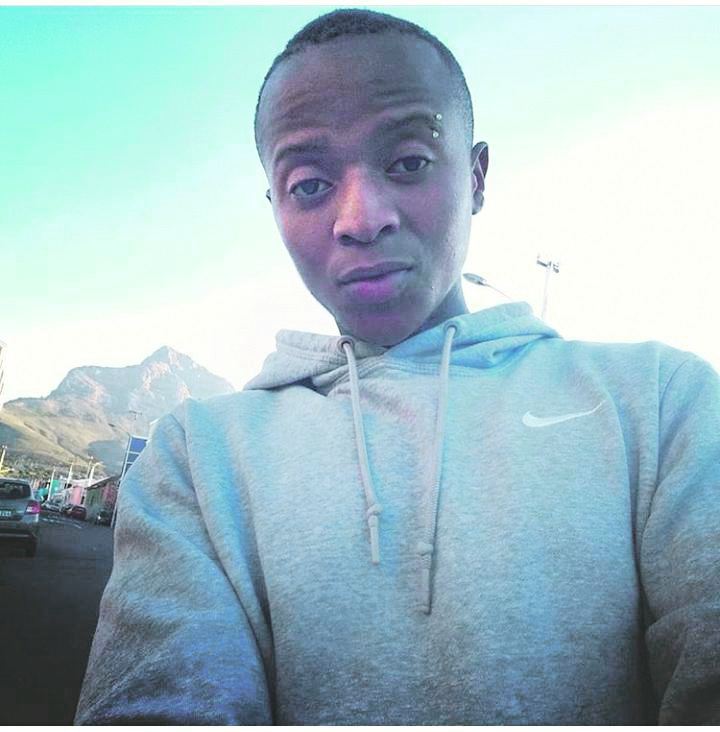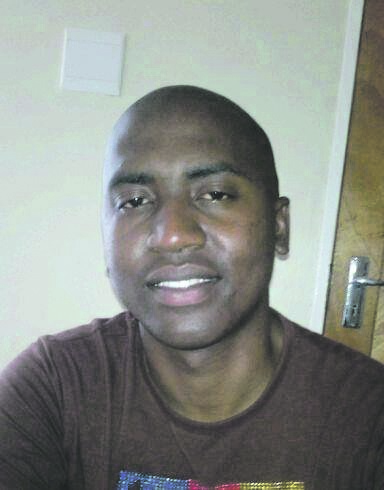
The face of queer SA is most often the rich, flamboyant showman, the straight-talking bad girl or the neighbourhood hairdresser, but nothing could be further from the truth, writes Ndileka Lujabe after chatting with a cashier, a cop, a mechanic, a paramedic and a clerk about being out at work
You’re at the till at the supermarket, your items are swiped across the counter one by one like little soldiers marching in an army of inflation. You make small talk with the cashier, one eye on the ever-growing bill, another on the magazine cover where a fashionable lesbian bad girl is revealing all about her new partner and her battle with homophobia.
It probably doesn’t cross your mind that the cashier is lesbian too, but, if it did, would you wonder about her own battle to live her best life?
For working class people, being lesbian, gay, bisexual, transgender or intersex (LGBTI) can be like coming out of one closet and going into another, and that has to do with intersectionality – a combination of struggles that affect those who are most marginalised in society.
Being a person experiencing intersectional challenges is like standing in the middle of a road facing oncoming traffic from all sides.
In the case of the cashier, how does one balance being black, a woman, homosexual and part of a lower socioeconomic class in modern-day South Africa?
The paramedic
Biggie (27), who works in Cape Town as a paramedic, identifies himself as a masculine gay man. It goes almost without saying that Biggie is not his real name. He says that his social life is strained and that he feels pressured to have friends who look straight so that he can fit in.
“When I’m with my friends, I hear the kind of remarks they make when they see someone gay walk by. I’m scared of what they will say [about me] and that’s why I keep to myself and don’t comment because I know they are homophobic,” he says.
Conflicted about keeping up appearances, Biggie acknowledges that he has a hint of internalised homophobia in how he relates to more feminine gay men.
“There are gay guys in my location who wear make-up and all those things. We buy beers and chill with them; my friends don’t have a problem with them. I don’t know if it’s wrong of me, but I don’t like those guys … I don’t chill with them [without my friends],” he says.
“I don’t think my family would have a problem with me being gay, but I don’t see myself telling them that I’m like those people they have a perception about. My mother will say something like: ‘Ja, those moffies.’ I don’t say anything, I just leave the room.”
Because he’s struggling to fit into a society that openly rejects gays, Biggie is dating someone of the opposite sex.
“I’m involved with a woman. I’m not in love with her or anything, but it’s just a way of covering myself. I live in the same neighbourhood as my family, so I make sure that she comes to my place, but I don’t meet with her outside.
“My colleagues always ask me why they don’t see me with a girl and I lie and say I do have someone. There’s a colleague who always insists that I’m gay, but I always deny it when she asks.”
His struggle to live openly has affected his relationships.
“I’ve had four relationships, but three of those weren’t serious. I never had sexual intercourse with those people. The one I’m involved with now, when we do have sex, I don’t feel comfortable and I think of other things,” he says.
When it comes to his life as a paramedic, Biggie says that he keeps to himself and that, by not coming out, he is able to enjoy his job and perform his duties.
The cashier
Nonzuzo, who also doesn’t want us to use her real name, is a 32-year-old lesbian who works in Johannesburg as a cashier for a supermarket chain. She lives with her partner of three years and they want to have a child together.
“I have a child already from a previous relationship with a man, but I would like another one with my girlfriend. It’s nice having a child with someone you love and want to build a life with,” she says.
Because of financial constraints, she might not
be able to have a child this time around in “the natural way”.
“There’s this thing ... artificial insemination, which is very expensive. You have to pay for so many consultations with doctors and things like that. It’s not natural, but what can we do?”
She hasn’t told her family or friends about her visits to the insemination doctor because she knows how they will react.
“They were shocked when I told them I was a lesbian, now imagine I come back with this? I know they will say funny things and say I’m crazy. They won’t understand,” she says.
“Even at work, they don’t understand how I have a child but I’m a lesbian. They will say: ‘How is it possible? You’re with a woman.’ I always have to explain myself. So, with people like that, I stop talking about my personal life.”
Adoption is also an option.
“My partner’s sister passed away and her children live with the grandmother. We will hopefully adopt them and raise them as our own.”
The mechanic
Benjamin Mofokeng is 23 and lives in Bloemfontein, where he works as a mechanic. Despite being out in his place of work, he still worries about his job because of how he may be perceived.
“I started at a new company and this white guy who was my senior told the boss that I was gay. He said to me: ‘I don’t know where you’ll get a job if you’re that gay.’ I worry because what if the boss is homophobic and then I don’t get the job?”
When looking for work, Benjamin says he has to think twice about what he’s going to wear to the interview and about how he presents himself.
“What if I’m criticised about what I’m wearing? What if I’m wearing all pink and the boss says we need a man, not a woman? It means I have to show 10 times more that I’m the right person for the job.”
He says he’s neither femme nor masculine.
“I’m both. I can be girlish with my friends, but I will check the situation first around other people so that I don’t make them uncomfortable. I suppress myself so that I’m not too much for people because some people get annoyed with that.”
It was challenging for Benjamin to adjust to a masculine work environment.
“I was very shy and I’d think: ‘Eish, I look so girlish.’ For the longest time, I wouldn’t tell people what I did for a living because of the criticism. It wasn’t easy in the beginning because I was working with things that were only for strong men.”
Benjamin, who has dreams of being a lawyer, says he intends to move to another city where he can have more opportunities.
“Before the end of the year, I’m going to leave Bloemfontein because I don’t think I am growing in the industry that I chose. It’s only white people who get positions because of their language and the like.”
The cop
Mondli Mzulwini (36) works as a homicide investigator for the SA Police Service.
“If someone asks, I’ll always say I’m gay; it’s not a secret. I don’t experience homophobia because I don’t allow it, but some colleagues think that all gay people know each other and they will call me even when I’m off duty and say: ‘Come to the station; there’s a gay person here.’ I always have to put them in their place,” he says.
Mondli’s colleagues accept him because they like him, but “they say hateful and dismissive things about other gay people, especially lesbians. I always have to educate them about how to treat people, but sometimes I think I’m wasting my time.”
On the streets, he finds more homophobia than tolerance.
“A lot of gay people are portrayed on TV and some see it as good to tell gay stories, but I disagree. There are people like Somizi Mhlongo who are positively accepted, mostly by women.
“But Somizi is to straight people what Nelson
Mandela is to white people – they love Somizi, but hate other gay people. Now we have this one person who represents every gay person,” he says.
“I know he always speaks out against homophobia, but, then again, he can afford to. He has all the money and has nothing to lose, but what about a lesbian working in a supermarket? Can she speak out? Maybe if we put her on TV she’ll have a voice.”
Mondli’s job demands a lot from him mentally and physically. He talks about how hard it is in the black community to fight the stigma of seeking professional help after being exposed to trauma.
“We are not socialised and brought up to go to a therapist and talk. There are social workers for us at work, but people start rumours saying that the social workers will gossip and tell other people about your problems. So no one ends up going to speak to them.”
The clerk
Thirty-year-old Lloyd is an admin clerk who lives in Tembisa and identifies as a feminine gay man. He also speaks about how gay men are perceived to be wealthy.
“I don’t have lots of money. I work hard to have the money that I have. This notion exists because, as gay men, we are unique, talented, intelligent and live life according to our own rules. People then perceive this as us having money and date us for this reason when, in fact, we work the same jobs as them.”
Lloyd started his working life as a gardener and then became a cleaner before he got into admin.
“It was hard gardening because the people I worked with would call me a sissy. So I tried to act strong and masculine, but I’d struggle. My friends would make fun of me and ask why I didn’t go and work at a hair salon. But I had certain ambitions and continued as a gardener.”
Lloyd also speaks about the lack of positive representation for working-class queer people.
“The media paints us in a bad light. We do good things in the community, but people associate us with alcohol or as people who steal their men ... all those funny things. We are people who also have feelings and suffer just like them,” he says.
“While growing up, there were many gays in the township, but they were scared to come out because of the violence against queer people. I was angry and confused, and asked God: ‘Why me?’”
Today, he feels differently.
“I believe that God knew before I was conceived that I would be gay. I don’t think He made a mistake; He loves me. If He didn’t, I wouldn’t be alive right now.”
Tembisa is safer now and isn’t as terrifying as it used to be when he was younger.
“You would get sent to the spaza to buy tomatoes and take two hours because you’d be scared of the boys standing at the corner waiting to beat you up.”
Lloyd says that the fight queer people face now is one for acceptance.
“The community must be more involved. Especially with Pride events. They mustn’t just say: ‘Oh it’s the gays marching, it’s their Christmas.’ They must involve themselves because that’s how they’ll understand us as people. It’s 2018 now, we are done fighting. The Somizis and Simon Nkolis fought for tolerance long ago already, now it’s time for acceptance.”
* This series on LGBTI life in Africa is made possible through a partnership with The Other Foundation. To learn more about its work, visit theotherfoundation.org
TALK TO US
Do you face homophobia in the workplace?
SMS us on 35697 using the keyword WORKPLACE and tell us what you think. Please include your name and province. SMSes cost R1.50
OR
Let us know in the comments below




 Publications
Publications
 Partners
Partners











